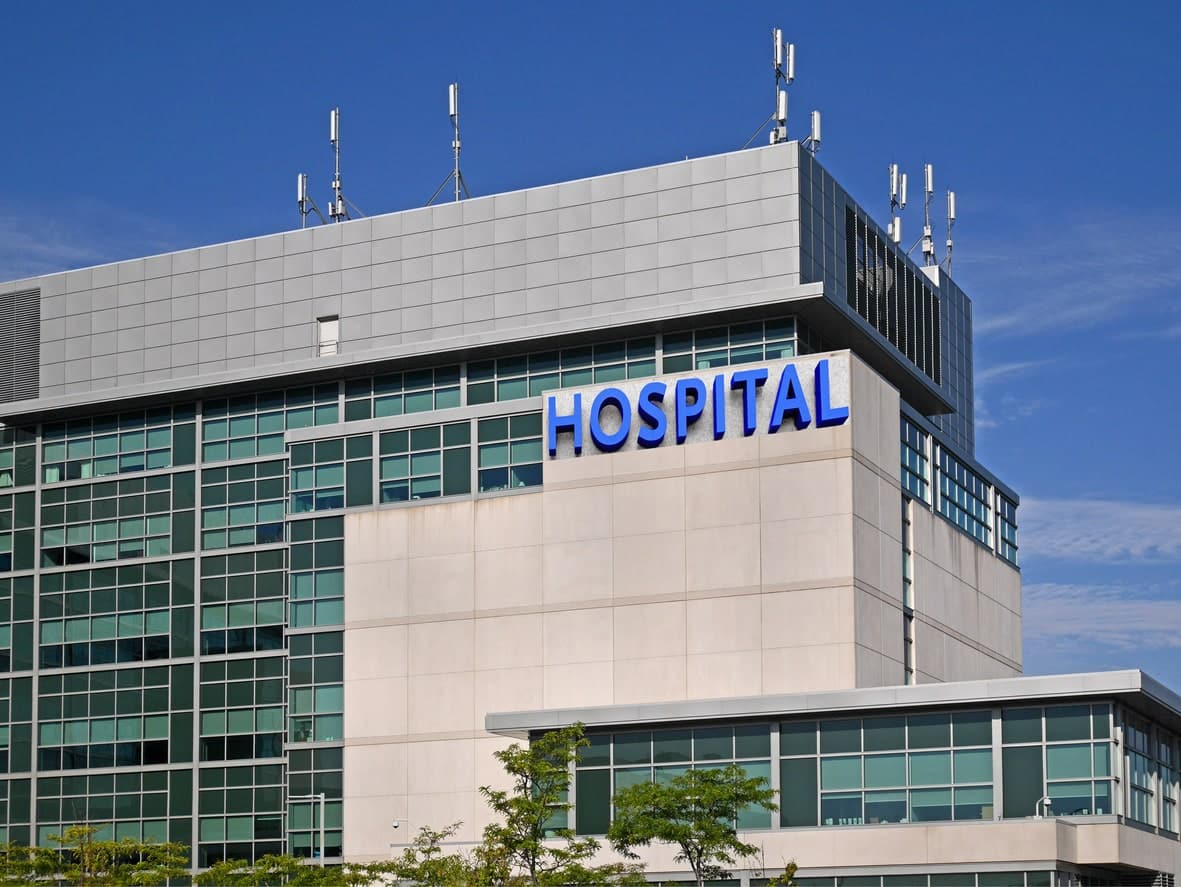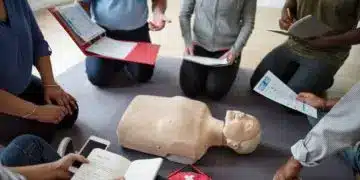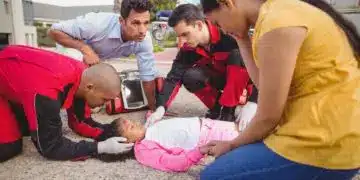Cardiopulmonary resuscitation, or CPR, is a critical and oftentimes life-saving intervention performed on individuals who have encountered sudden cardiac arrest, heart attack, or other life-threatening emergencies. While the focus often rightly hones in on the physical recovery and the survival story itself, what is often overlooked is the profound psychological impact that CPR can have on the survivors. The echoes of these experiences ripple through a person’s life, influencing their mental well-being long after the physical wounds have healed.
Herein lies a sensitive, yet imperative exploration of the psychological journey for CPR survivors – a comprehensive guide for understanding, coping, and supporting a survivor’s mental recovery. This meticulous trek through the emotional landscape after surviving CPR is designed to resonate deeply with those who are maneuvering through the complexities of post-recovery life.
Introduction
When an individual performs CPR, they are not just initiating a mechanical process of compressions and breaths; they are the bridge to life for the person they are helping. This lifesaving touch is nothing short of miraculous, yet it is merely the first step in an individual’s journey. What follows is a cascade of physical, psychological, and emotional events that are intricate and unique to each survivor.
Understanding the multifaceted nature of recovery is crucial. It’s not just about physical healing. It’s about the spirit too — the unseen wounds that linger long after the heart beats on its own again. This proactive approach to post-CPR recovery sheds light on various facets of psychological healing, underlining their importance in supporting a survivor through their process.
Part 1: Understanding the Psychological Impact
The psychological impact of surviving CPR is profound and multifaceted. It is a journey marked not just by the shock of the event, but also by the emotions and changes that it incites. From immediate emotional trauma to long-term conditions like PTSD, the psychological toll can be just as enduring as any physical ailment.
Emotional Trauma and the Shock of Survival
Emotional trauma after CPR can manifest in a spectrum of responses. Survivors may experience shock, disbelief, or elation from having a second chance at life. The realization of facing death head-on can be overwhelming and the emotional aftermath significant. It’s a rollercoaster that can leave survivors feeling vulnerable, scared, and sometimes, isolated.
The Elation of Survival
Some survivors may feel an incredible sense of joy and gratitude, often referred to as survivor’s elation. This surge of positive emotion can be a welcome departure from the chaos and fear of the initial event, but it can also be fleeting. Its departure can leave a survivor feeling emotionally flat or even anxious about the uncertainty of their future.
The Fear of Death
Others may grapple with the lingering fear of death. The experience of CPR serves as a stark reminder of mortality and can lead to a preoccupation with one’s health and the fear of another medical emergency. This fear can be incapacitating, causing a survivor to withdraw from activities and life itself.
Post-Traumatic Stress Disorder (PTSD)
PTSD is a mental health condition that can develop after experiencing a traumatic or life-threatening event, such as CPR. Symptoms can include flashbacks, nightmares, severe anxiety, and uncontrollable thoughts about the event.
Re-experiencing the Trauma
One of the hallmarks of PTSD is the phenomenon of re-experiencing the traumatic event. For CPR survivors, this might manifest as vivid memories, often when they least expect it, or as nightmares during sleep. Such experiences can be profoundly distressing, re-igniting the fear and helplessness felt during the initial event.
Avoidance and Emotional Numbing
In an effort to cope with the traumatic experience, some survivors may begin to avoid people, places, or activities that remind them of the event. They may also become emotionally numb, feeling detached from life and the people around them. This emotional distancing is often a protective measure, an attempt to shield oneself from further pain.
Hyperarousal and Increased Irritability
PTSD can lead to a state of hyperarousal, where survivors are constantly on edge, easily startled, and quick to react with anger or irritation. Sleep disturbances and difficulty concentrating are common, exacerbating the sense of being constantly on guard and unable to relax.
Anxiety and Depression
Anxiety and depression are common responses to surviving a traumatic event. For many, the mere thought of experiencing another life-threatening situation can cause a persistent state of anxiety or panic. Depression, on the other hand, can set in with feelings of helplessness, hopelessness, and a lack of interest in life.
Lingering Anxiety
A chronic state of anxiety can be debilitating, affecting a survivor’s ability to function on a daily basis. Fear and worry can be all-consuming, and physical symptoms like a racing heart or shortness of breath can be constant reminders of the survivor’s distress.
The Veil of Depression
Depression can cast a veil over the survivor’s life, stripping the world of its color and joy. The thought of mortality and the pressures of recovery can feel insurmountable, leading to a profound sense of despair. In the wake of CPR survival, the daily struggle against depression can be an enduring challenge.
Part 2: Coping Strategies for CPR Survivors
While the psychological journey after surviving CPR can be daunting, there are strategies that can help survivors navigate the road to recovery. By addressing their emotional needs head-on, survivors can find solace, strength, and the resilience to heal their spirits.
Seeking Professional Therapy or Counseling
Psychological healing often begins with therapy or counseling. Trained professionals can provide survivors with the tools and support necessary to work through the complex emotions they are experiencing. Therapy sessions tailored to their needs can be a safe space for survivors to express their fears, sadness, and any other emotions that may be lingering from the event.
Cognitive Behavioral Therapy (CBT)
CBT is a particularly effective form of therapy for trauma survivors, including those who have undergone CPR. By working to change negative thought patterns and behaviors, CBT empowers survivors to manage their emotions and reduce anxiety.
Eye Movement Desensitization and Reprocessing (EMDR)
EMDR is another therapy that has shown promise in treating PTSD. This innovative treatment uses bilateral stimulation, such as eye movements or taps, to help survivors reprocess their traumatic memories in a less distressing way.
Joining Support Groups and Connecting with Other Survivors
There is immense comfort to be found in shared experiences. Support groups can be a lifeline for survivors, creating a community of individuals who truly understand what they are going through. By connecting with others who have undergone similar events, survivors can feel less alone and more understood.
The Power of Peer Support
Peer support can be a powerful source of resilience, providing survivors with a sense of belonging and validation. Hearing others’ stories of survival and their paths to recovery can be empowering, offering hope and strength to survivors in their own journeys.
Finding Online Communities
In the digital age, survivors do not need to be in the same physical location to support each other. Online communities and forums provide a platform for survivors to connect, share, and find support. These virtual spaces can be especially valuable for those who may have difficulty attending in-person group meetings.
Engaging in Self-Care Activities
Self-care is not a luxury — it is a necessity for survivors to tend to their mental and emotional well-being. Engaging in activities that promote relaxation and pleasure can help reduce stress, anxiety, and other symptoms of trauma. Self-care looks different for everyone, so it’s important for survivors to find what works for them.
Prioritizing Rest and Relaxation
Survivors often need to give themselves permission to rest and recover. This may involve prioritizing sleep, taking leisurely walks, or enjoying a hot bath. The simple act of slowing down can be immensely healing for a mind that’s been through so much.
Exploring Creative Outlets
Engaging in creative pursuits can be a cathartic way for survivors to express their emotions and make sense of their experiences. Whether through writing, painting, or music, creativity can be a powerful tool for processing trauma.
Creating a Support Network of Family and Friends
Survivors do not have to go through their recovery alone. Building a support network of loved ones can provide a stable foundation for emotional healing. Family and friends can offer companionship, empathy, and practical assistance, easing the burden of the journey.
Communicating Openly with Loved Ones
Open and honest communication with family and friends is key. By sharing their feelings and needs, survivors can foster a supportive environment in which their loved ones can understand and help them through their recovery.
Setting Realistic Expectations for Recovery
Survivors and their support networks should work together to set realistic expectations for the recovery process. This includes understanding that healing takes time and that setbacks can occur. By approaching recovery with patience and flexibility, survivors can reduce the pressure they may feel from themselves or others.
Part 3: Tips for Family and Friends of CPR Survivors
The support of family and friends is invaluable to a survivor’s psychological recovery. Loved ones play a crucial role in providing comfort, understanding, and encouragement as the survivor navigates the complex terrain of emotions post-CPR.
Educating Themselves About the Psychological Impact
Loved ones should make an effort to educate themselves about the psychological impact of surviving CPR. Understanding the emotional challenges that survivors face can help family and friends offer more informed and supportive care.
Becoming Familiar with PTSD and Its Symptoms
PTSD can be particularly challenging for survivors and their loved ones. By learning about the symptoms and signs of PTSD, family and friends can recognize when a survivor may need additional support or intervention.
Exploring Resources on Psychological Recovery
There is a wealth of resources available to help loved ones support CPR survivors through their psychological recovery. Books, articles, and online materials can provide insights and tips on how to best help a survivor heal emotionally.
Providing Emotional Support and Understanding
Emotional support is a tremendous gift for a survivor. Family and friends can offer a listening ear, a shoulder to lean on, and the validation of a survivor’s feelings.
Creating a Safe Space for Open Conversation
Creating an environment where a survivor feels comfortable speaking openly about their emotions is essential. Family and friends can demonstrate their willingness to listen without judgment, which can be profoundly comforting for a survivor.
Offering Reassurance and Comfort
Survivors often wrestle with feelings of anxiety and uncertainty. Family and friends can provide reassurance and comfort, reminding the survivor that they are safe and loved, and that it is okay to take the time they need to heal.
Encouraging Professional Help When Needed
Sometimes, the support of family and friends is not enough, and professional help may be necessary. Loved ones should encourage survivors to seek help from therapists, counselors, or support groups when the need arises.
Normalizing the Idea of Therapy
There should be no stigma associated with seeking therapy. Loved ones can play a crucial role in normalizing the idea of therapy, emphasizing that it is a common and beneficial avenue for processing trauma and emotions.
Exploring Treatment Options Together
Family and friends can support survivors by helping them research and explore different treatment options. By showing an active interest in their recovery, loved ones can help survivors feel less alone in their journey.
Promoting a Safe and Supportive Environment
Creating a safe and supportive environment is paramount. Loved ones can promote this by showing patience, empathy, and a non-judgmental attitude towards the survivor’s experience.
Encouraging Healthy Coping Mechanisms
Healthy coping mechanisms can provide relief from the emotional strain of recovery. Loved ones can encourage survivors to engage in activities that promote relaxation, such as exercise, meditation, or hobbies.
Addressing Any Warning Signals Promptly
It’s essential for family and friends to address any warning signals or concerning behaviors promptly. Seeking help early can prevent symptoms from worsening and help survivors get back on the path to healing.
Part 4: The Role of Healthcare Professionals
Healthcare professionals play a critical role in the care and recovery of CPR survivors. Their vigilance in identifying and addressing psychological needs is integral to a well-rounded recovery process.
Identifying and Addressing Psychological Needs During the Recovery Process
Healthcare providers are often the first to witness and tend to a survivor’s psychological needs. Through attentive observation and compassionate care, they can identify when a survivor is struggling and in need of support.
Creating a Post-CPR Psychological Assessment
A post-CPR psychological assessment can help professionals gauge a survivor’s mental health and well-being. This assessment will allow for early intervention and support, reducing the impact of psychological distress.
Offering Immediate Crisis Counseling When Necessary
Immediate crisis counseling can be crucial for survivors dealing with acute psychological distress. By providing support at the time of the event, professionals can help survivors manage their immediate reactions and start their journey to recovery with tools to navigate their emotions.
Collaborating with Mental Health Professionals
When it comes to the psychological recovery of CPR survivors, a team approach is often best. Healthcare professionals can collaborate with mental health specialists to provide comprehensive care.
Sharing Patient Information and Progress
Open lines of communication between healthcare providers and mental health specialists ensure that all involved parties are aware of a survivor’s progress and particular needs. This sharing of information can lead to a more cohesive and effective treatment plan.
Consistent Support and Follow-Up Care
Consistent support and follow-up care are vital to a survivor’s psychological recovery. Regular check-ins and appointments with mental health professionals can help keep survivors on track and provide the necessary guidance and intervention as they heal.
Offering Resources and Referrals for Psychological Support
Equipping survivors with resources and referrals for psychological support can be a lifeline. Healthcare professionals can offer information on support groups, helplines, and other services to help survivors find the additional help they may need.
Providing Information on Local Support Groups
Local support groups can offer a sense of community and understanding to survivors. Healthcare professionals can provide survivors with information on where to find these groups so they can connect and share with others who have similar experiences.
Referring Survivors to Qualified Mental Health Professionals
When individual or specialized therapeutic help is needed, healthcare professionals can refer survivors to qualified mental health professionals who can offer targeted support and evidence-based treatments for trauma and PTSD.
Conclusion
The path to psychological recovery for CPR survivors is monumental and unique. It is a chapter in the larger story of their survival that deserves to be recognized, addressed, and supported. By understanding the breadth of the emotional response to CPR, survivors can take steps to cope, heal, and thrive.
The call to action is clear: survivors need to know that they are not alone, and that it is okay to seek help. The family and friends of survivors have a duty to provide unwavering support. Healthcare professionals must remain vigilant and proactive in addressing the mental health needs of those who have faced death and lived to tell the tale.
CPR survivors, we see you. We hear you. The journey of recovery is before you, and it deserves all the care and consideration we can muster as a community. Together, let us ensure that the unseen wounds of survival are tended to with the same diligence and compassion as the seen. The story of CPR survival doesn’t end with a heartbeat; it continues in the solace of a spirit astir and a mind at peace.






